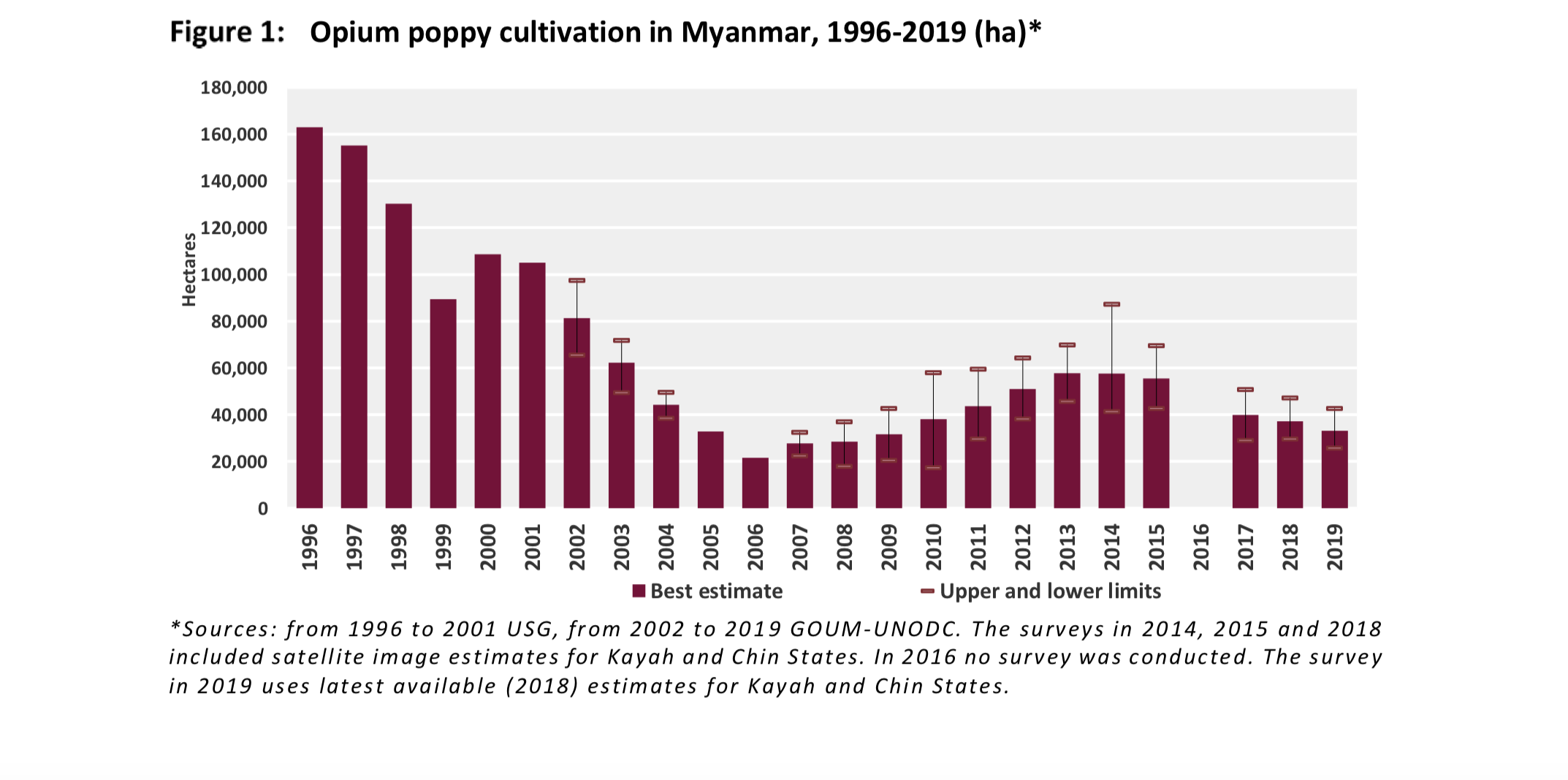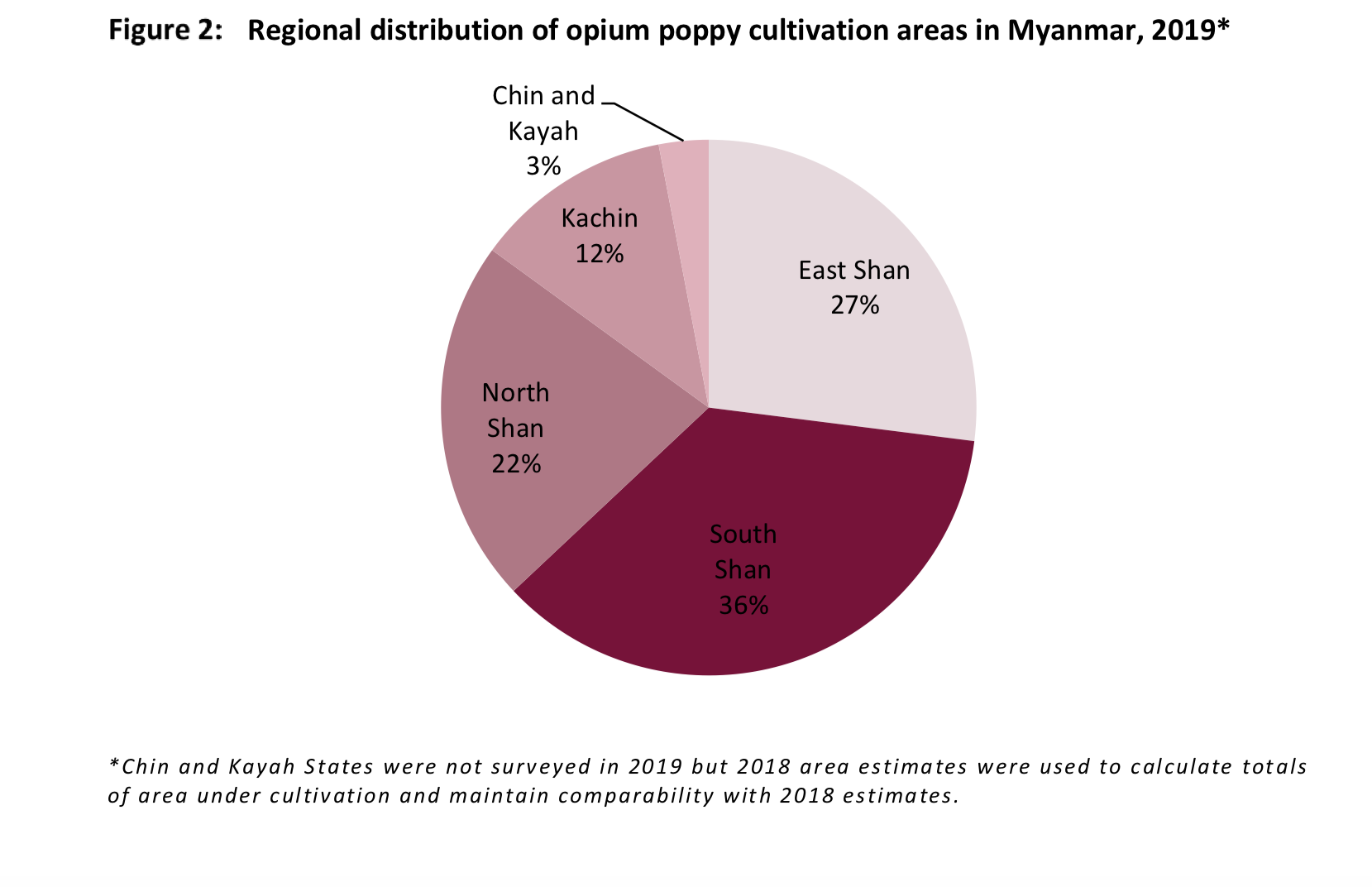CHIANG MAI, Thailand—Opium cultivation in Myanmar decreased last year, continuing the downward trend that started in 2014 due in part to the continuing shift in the regional drug market towards synthetic drugs, according to a new UN survey.
According to the United Nations Office on Drugs and Crime (UNODC) Myanmar Opium Survey 2019, released on Tuesday in Naypyitaw, the amount of land cultivated for opium dropped 11 percent in 2019 to 33,100 hectares (ha), continuing the downward trend from 57,600 ha in 2014.
Decreases were observed in Shan State’s northern, eastern and southern areas with drops of 7, 8 and 17 percent respectively, but cultivation increased slightly in Kachin State, up 15 percent from 2018.
Despite the declines, the UNODC said that “the highest levels of cultivation continue to take place in unstable and conflict prone areas of Shan and Kachin.”

It added that opium cultivation, heroin production and trafficking, and the evolving illicit drug economy, including heroin and synthetic drugs, “are affecting peace and stability in the country and surrounding border areas.”
Shan and Kachin states are Myanmar’s main opium producing areas and UNODC focused its 2019 survey on these states. In 2018, Chin and Kayah states were included in the survey. UNODC conducts the Myanmar Opium Survey jointly with the Central Committee for Drug Abuse Control (CCDAC) under Myanmar’s Ministry of Home Affairs.
Shan State now accounts for 85 percent of total cultivation in Myanmar but the area under cultivation dropped 14 percent to 28,000 ha in 2019, continuing a downward trend that started in 2015 when Shan had an estimated 50,300 ha of cultivation. Shan State had 36,100 ha in 2018 and 41,000 hectares in 2017.
Inshik Sim, Drug Program Analyst for the UNODC Office for Southeast Asia and the Pacific, told The Irrawaddy in an email that opium poppy cultivation in Kachin State is “largely concentrated in the north-western zone of Tanai Township and the area east from Myitkyina city next to the international border with China,” referring to an area controlled by the military-backed Kachin border guard force, the New Democratic Army-Kachin (NDA-K). NDA-K controls part of Sadung (Sadone), a sub-township in Waingmaw Township bordering China, and partly controls the Sadung-Kan Paik Ti (Kan Pike Tee) trade route.
UNODC faced criticism from the Kachin Independence Organization (KIO) in February last year over its 2018 report which said that the highest concentrations of opium cultivation in the country are in areas under the armed group’s control.
The KIO then released its own survey in June 2019 of over 10,000 ha in Kachin and northern Shan State which compiled information collected between July 2018 and March 2019 and showed that opium production did not decline but has actually increased in the area.
According to the UNODC report, in 2019 poppies were grown in high concentrations in the eastern part of northern Shan, where multiple armed groups—ethnic armed revolutionary groups and military-back militias and military troops—are based, but “the majority of northern Shan region presents areas with medium cultivation levels.”
The survey collected information from analyses of satellite imagery as well as field visits to opium poppy-growing villages to interview farmers and to measure yields of opium capsules.
“As some areas, in particular Kachin and North Shan, are in conflicts, ensuring security of our staff was one of the major challenges. It needs close coordination with the government and analyses of the security situation,” Sim added.

Jeremy Douglas, Regional Representative of the UNODC Regional Office, said that UNODC will continue to work with Myanmar and communities in Shan “to assist the transition from opium to sustainable economic alternatives” and also to discuss “options to help Kachin, given the situation and needs there.”
The Myanmar government also pledged further cooperation with the UN agency and said it would provide more support to opium producing areas.
“We will also expand collaboration with Mekong MOU countries and UNODC to address organized crime and the production and cross-border trafficking of drugs and precursor chemicals,” Minister of Home Affairs Lieutenant General Kyaw Swe said in the UNODC statement.
“Major international organized crime groups are using conflict areas in the north to source heroin and produce and traffic synthetic drugs,” said Douglas. “They have the access to territory and relationships they need to do business.”
“The situation here is having a profound impact on the broader Asia Pacific region—it is in everyone’s interests to address the illicit drug economy in Myanmar and the Mekong,” he added.
Later this month, UNODC will convene a meeting among senior law enforcement officials from Southeast Asia and other regions—East Asia, South Asia and North America as well as Australia—to exchange information and develop concrete action-oriented plans.
In addition to geographic information, the report also documented the average opium yield per hectare and data on opium prices and markets. The average yield in Myanmar was estimated at 15.4 kg per hectare for 2019, a 9 percent increase from 2018.
The price for fresh opium declined by more than 60 percent between 2015 and 2019. The report showed that the amount farmers themselves are paid for opium has continued to decrease, dropping 4-7 percent between 2018 and 2019, with the total decrease over the last four years totaling a staggering 51-63 percent.
Domestic heroin consumption and export also decreased in 2019. Myanmar consumed 6 tons of heroin in 2019, valued at US$152-290 million, down from 7.6 tons valued at $238- 401 million in 2018. Myanmar exported 23-52 tons of heroin in 2019, generating as much as a billion dollars domestically. In 2018, the country exported 20-45 tons of heroin, worth as much as $1.8 billion.
The report noted that these trends can be “an indication of a decreased demand for opiates from Myanmar in the country and the region.”
Sim added that opium poppy cultivation has decreased in part due to assistance for opium poppy farmers to switch to alternative sources of income.
“However, it is also important to note that the drug markets in Myanmar and neighboring countries are rapidly changing, from opiates (heroin and opium) to synthetic drugs, in particular methamphetamine,” said Sim. “One of the major challenges in the region is trafficking of precursor chemicals (drug making chemicals) into drug manufacturing sites.”
UNODC recently initiated a program to improve control of precursor chemicals in the region. The program has begun to shift the strategies of Southeast Asian countries from merely focusing on drug seizures to addressing flows of precursor chemicals.
Although demand for heroin continues to drop, organized crime groups still generate substantial revenues from the drug in Myanmar.
Opium cultivation and heroin production in Myanmar also continue to pose significant public health and security challenges for Southeast Asia and neighboring countries, including East Asia and Australia.
An estimated 3 million heroin users remain in the region, with the retail market generating approximately $10 billion annually.

















